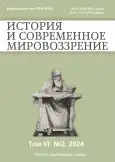The World of Services and Things in the Soviet Press of the 1920s — 1930s
- Authors: Klinova M.A.1, Trofimov A.V.2,3
-
Affiliations:
- Institute of History and Archeology of the Ural Branch of the Russian Academy of Sciences
- Ural State University of Economics
- Syktyvkar State University named after Pitirim Sorokina
- Issue: Vol 6, No 2 (2024)
- Pages: 86-91
- Section: SOCIOCULTURAL COMMUNICATIONS IN THE PAST AND PRESENT
- URL: https://journal-vniispk.ru/2658-4654/article/view/265989
- EDN: https://elibrary.ru/VCITTD
- ID: 265989
Cite item
Abstract
The purpose of the study. The article attempts to reconstruct the figurative series of standards of material consumption of the urban population of the USSR, presented in the Soviet press of the 1920s–1930s. Conclusions. The content of the standards of material consumption was determined by the ideological vector (building socialism"), directly depended on the dynamics of socio-economic development, the success of modernization processes. In the USSR in the 1920s–1930s, significant transformations took place in the specifics and content of the standards of material consumption of the population. In the 1920s, the content of the Soviet press was dominated by an emphasis on breaking with the pre-revolutionary past, proclaiming simplicity and the absence of material fetishism. In the 1930s, priorities changed. The world of things is recognized as a necessary component of the Soviet man. Fashion and advertising in the second half of the 1930s formed a fairly high standard of material consumption, although the real level of provision of goods to the population was significantly inferior.
Full Text
##article.viewOnOriginalSite##About the authors
Marina A. Klinova
Institute of History and Archeology of the Ural Branch of the Russian Academy of Sciences
Author for correspondence.
Email: klinowa.m@yandex.ru
ORCID iD: 0000-0003-0725-4161
SPIN-code: 6052-1285
Scopus Author ID: 57195422603
Dr. Sci. (Hist.), Associate Professor, Senior Researcher
Russian Federation, YekaterinburgAndrey V. Trofimov
Ural State University of Economics; Syktyvkar State University named after Pitirim Sorokina
Email: 2519612@rambler.ru
ORCID iD: 0000-0002-3419-6051
SPIN-code: 5810-4682
Scopus Author ID: 57205103265
Dr. Sci. (Hist.), Professor, Professor of the Department of Creative Management and Humanities; Ural State University of Economics
Yekaterinburg, Russian Federation; Professor of the Department of Russian History and General History; Syktyvkar State University named after Pitirim Sorokina; Syktyvkar, Russian Federation
Russian Federation, Yekaterinburg; SyktyvkarReferences
- Volkov V. V. The concept of culture, 1935-1938: Soviet civilization and everyday life of Stalin's time // Sociological Journal. 1996. № 1−2. Pp. 194−213.
- Volobueva T. Soviet advertising of the 1920s-1930s. // Advertising technologies. 2006. No. 4. Pp. 18–23.
- Gurova O. Y. Ideology of consumption in Soviet society // Sociological Journal. 2005. No. 4. Pp. 117–131.
- Klinova M.A. The concept of "culture" in social policy of the second half of the 1930s // Man. 2017. No. 4. Pp. 94–105.
- Kostyleva A.Yu. The functions of visual images in the design of Soviet perfumery of the 1930s // Society. Science. Innovations: materials of the XIX All-Russian Scientific and Practical Conference. Kirov, 2019. Pp. 460–472.
- Lebina N. B. Daily life of the Soviet city: norms and anomalies. 1920–1930 years. St. Petersburg: Neva: Summer Garden, 1999. 316 p.
- Early Soviet Society as a social project, 1917–1930s: at 2 p.m. 2. Soviet society: culture, consciousness, behavior / under the general editorship of L. N. Mazur. Yekaterinburg: Ural Publishing House. unita, 2019. 462 p.
- Savelieva O. O. Soviet advertising of the 20s as a means of agitation and propaganda // Man. 2006. No. 2. Pp. 58–69.
- Salnikova E. V. Soviet Culture in motion: from the mid-1930s to the mid-1980s. Visual images, characters, plots. M.: URSS, 2014. 480 p.
- Tverdyukova E. D. «The engine... overhead costs»: commercial advertising in Soviet newspapers of the NEP period // Bulletin of the Leningrad State University named after A.S. Pushkin. 2014. Vol. 4. No. 2. Pp. 212–223.
- Chernyaeva E. N. The embodiment of the image of a Soviet man in costume sketches of fashion magazines of the 1930s // Bulletin of the Kemerovo State University of Culture and Arts. 2013. No. 24. Pp. 163–167
Supplementary files












